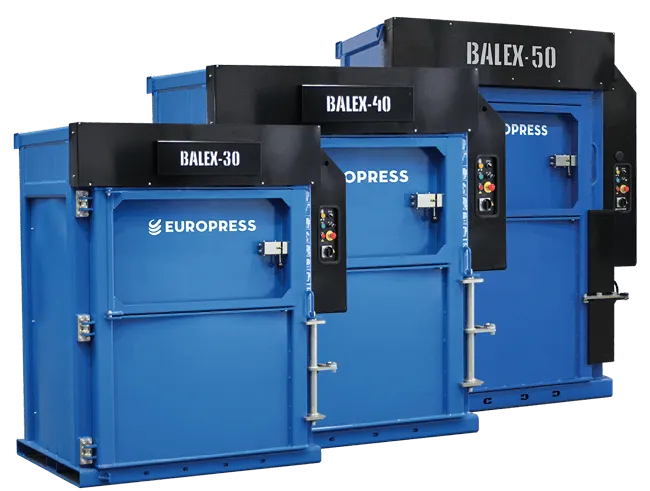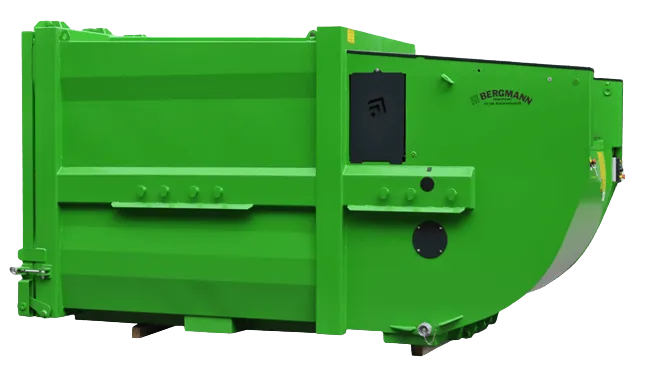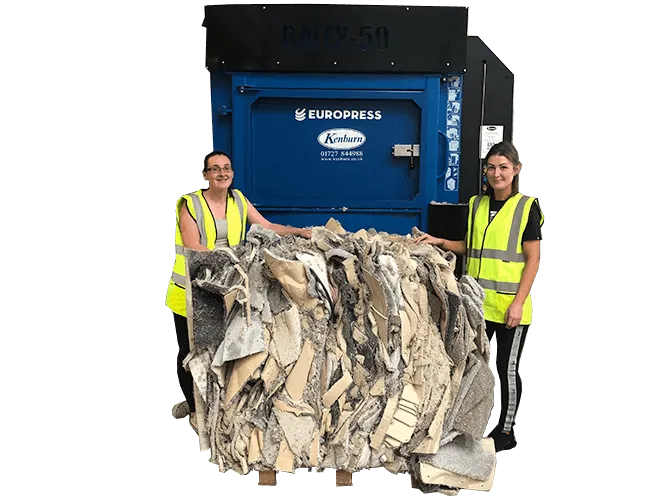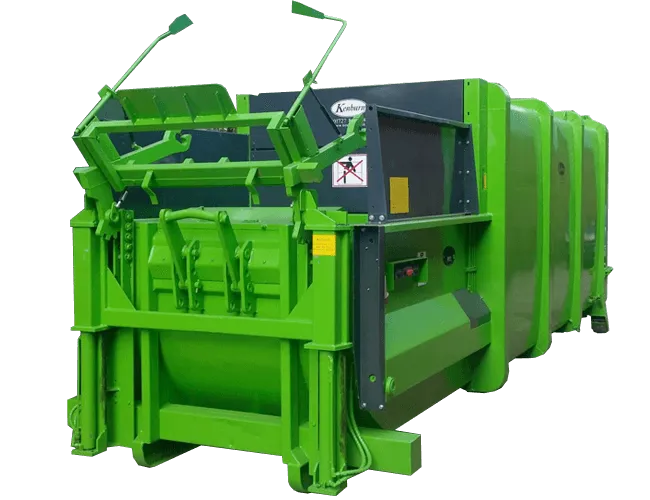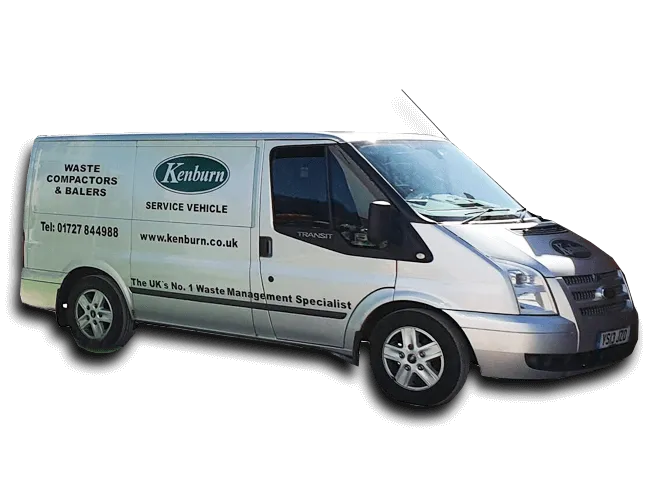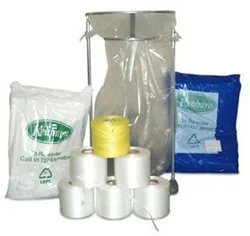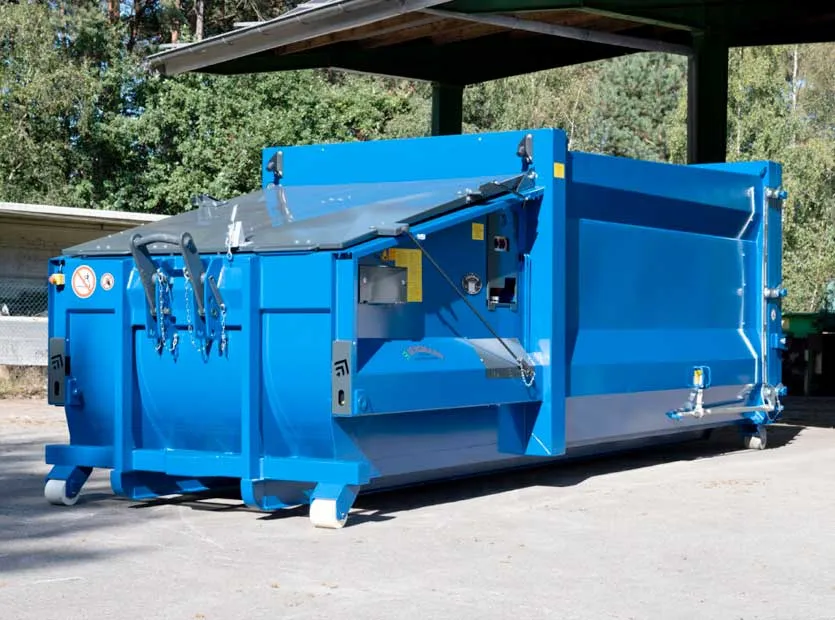 Whether you’re a waste management professional, facilities manager, or an environmentally conscious business owner, understanding the nuances between compactors and balers is crucial. These machines, though often confused, serve different purposes and cater to distinct waste management needs. At Kenburn, we offer a comprehensive range of both types of machine and so if in doubt you can always get in touch and one of the team will help to point you in the right direction.
Whether you’re a waste management professional, facilities manager, or an environmentally conscious business owner, understanding the nuances between compactors and balers is crucial. These machines, though often confused, serve different purposes and cater to distinct waste management needs. At Kenburn, we offer a comprehensive range of both types of machine and so if in doubt you can always get in touch and one of the team will help to point you in the right direction.
Have you ever wondered if a compactor or a baler is better suited for your waste management needs?
Key Takeaways
- Compactors compress mixed waste materials into manageable sizes, while balers create tightly bound bales of specific recyclable materials
- Compactors reduce waste volume, facilitating easier handling and lower disposal costs
- Balers enhance recycling efficiency by creating uniform bales, making storage and transportation easier
- Both machines offer unique benefits and applications, depending on the type of waste and business needs
- Knowing the distinction helps businesses improve waste management practices and achieve sustainability goals
Functions of Compactors and Balers
Both compactors and balers aim to improve waste management efficiency, but they do so in unique ways.
Compactors are designed to compress mixed waste materials into smaller, more manageable sizes. This process doesn’t discriminate against the type of waste—be it cardboard, plastics, or general refuse. By reducing the overall volume of waste, compactors make it easier to handle and decrease the frequency of waste collection services. This is particularly beneficial for businesses with limited space for waste storage.
On the other hand, balers create tightly bound bales of specific recyclable materials such as cardboard, plastics, or paper. The primary function of a baler is to facilitate the recycling process by producing uniform bales that are easier to store and transport. This uniformity aids in the efficient recycling of materials and helps businesses organise and segregate recyclables effectively.
Benefits of Using a Compactor
Implementing a waste compactor can bring multiple advantages to your waste management setup. These machines are particularly beneficial for businesses that generate a substantial amount of general waste.
Firstly, compactors can significantly reduce the volume of general waste. This ability is invaluable for businesses that deal with high volumes of mixed waste daily. By compacting the waste, you can enhance the efficiency of your waste management system and make the entire process more streamlined.
Another notable benefit is the decrease in the frequency of waste collection services. With compacted waste, bins do not fill up as quickly, allowing for fewer waste collection trips. This not only saves time but also reduces fuel consumption and emissions associated with waste collection vehicles, lending a hand to environmental sustainability efforts.
Moreover, compactors improve the hygiene and aesthetics of waste storage areas. With less waste piled up, these areas become cleaner and less prone to pests, odours, and potential health hazards. This makes a positive impression on visitors and creates a better working environment for employees.
Compactors are also highly versatile. They can handle a variety of waste types, including non-recyclables, which makes them a practical solution for businesses with diverse waste streams. From packaging waste to organic refuse, a compactor can manage it all, ensuring you don’t need separate equipment for different waste types.
Overall, contribute to lower waste disposal costs. By reducing the volume of waste, you can save on transportation and landfill fees, which can be a significant expense for many businesses.
Benefits of Using a Baler
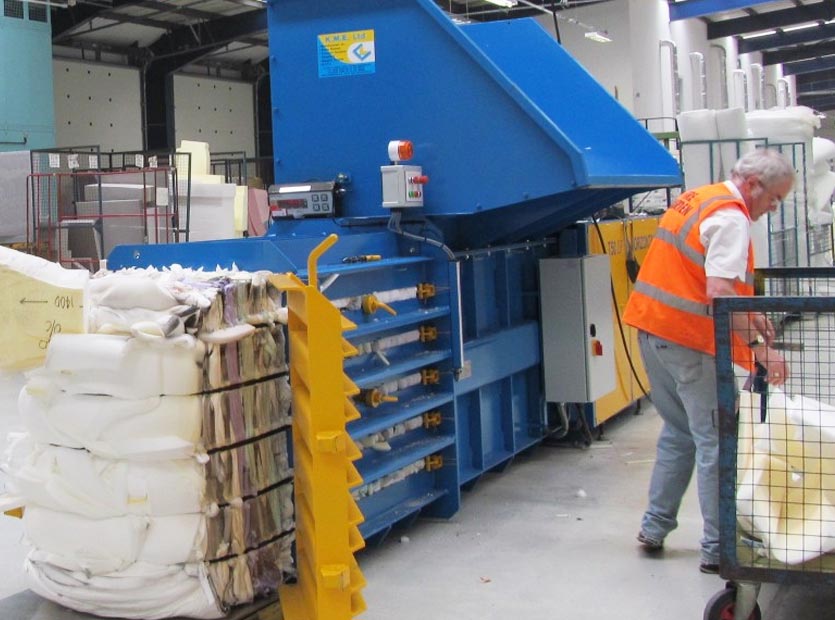 Balers come with their own set of advantages, particularly for businesses focused on recycling and sustainability. These machines are designed to simplify the recycling process by creating uniform bales of recyclable materials.
Balers come with their own set of advantages, particularly for businesses focused on recycling and sustainability. These machines are designed to simplify the recycling process by creating uniform bales of recyclable materials.
One of the primary benefits of using a baler is that it maximises storage space for recyclable materials. By compacting items such as cardboard and plastics into dense bales, you can significantly reduce the space required to store these materials. This is especially beneficial in facilities with limited storage areas.
Balers also help reduce transportation costs. With tightly bound bales, you can transport larger quantities of recyclables in fewer trips. This efficiency translates to lower fuel costs and reduced emissions, aligning with broader environmental goals.
Another advantage is the enhanced efficiency in waste segregation and recycling efforts. By baling specific recyclable materials, you streamline the recycling process and ensure that your waste management system runs smoothly. This efficiency can lead to quicker turnover and a more organised waste management operation overall.
Balers support businesses in meeting their recycling and sustainability goals. By encouraging and facilitating the recycling of materials, these machines help businesses comply with recycling regulations and contribute to environmental conservation efforts. This not only boosts the company’s environmental credentials but also enhances its corporate social responsibility initiatives.
Balers are also fairly straightforward to use, making the process of recycling less labour-intensive. This ease of operation means that staff can quickly learn to use the machine, leading to fewer disruptions and higher productivity in managing recyclable materials.
Applications of Waste Compactors
Waste compactors are incredibly versatile and can be implemented in various settings to streamline waste management processes. Different industries have diverse needs, and compactors can cater to many of them effectively.
Manufacturing and industrial facilities, for example, generate large volumes of waste materials ranging from packaging to scrap. Waste compactors in these environments can help to significantly reduce the volume of waste, making it easier to handle and dispose of. This efficiency can lead to lower disposal costs and cleaner, more organised workspaces.
Retail stores also benefit greatly from the use of compactors. With the constant influx of packaging waste from product deliveries, a compactor can help reduce the accumulation of packaging materials, freeing up valuable floor space. This makes the retail environment tidier and more customer-friendly while also reducing the frequency of waste collections.
Restaurants and hotels produce a high volume of food waste and general refuse. Implementing waste compactors in these settings can improve the hygiene of waste storage areas, reduce unpleasant odours, and minimise the risk of pest infestations. This not only enhances the customer’s experience but also ensures compliance with health and safety regulations.
Office buildings with a high output of waste, particularly paper and mixed refuse, also find compactors useful. These machines help in reducing the overall waste volume, making it easier to manage collections and maintain a clean working environment. This is particularly important in large office settings where waste can accumulate quickly.
Any business looking to minimise waste volume and improve hygiene can benefit from installing waste compactors. They offer a flexible and efficient solution to managing various types of waste, enhancing the overall effectiveness of your waste management system.
Applications of Recycling Balers
Recycling balers have a wide range of applications, particularly in industries that generate significant amounts of recyclable materials. These machines help in organising and processing recyclable waste, making the entire recycling process more streamlined and efficient.
Recycling centres are the primary beneficiaries of balers. These facilities utilise balers to process and prepare materials for resale or further recycling. By creating uniform bales of materials like cardboard and plastic, recycling centres can handle and transport large quantities of recyclables more efficiently, reducing the operational strain and improving profitability.
Manufacturing facilities also use waste balers extensively, especially for managing packaging waste. By baling scrap materials and packaging waste, these facilities can keep their workspaces cleaner and more organised. This can also lead to lower waste disposal costs and improved recycling rates.
Retail businesses greatly benefit from waste balers, particularly in handling the large volumes of cardboard and plastic packaging materials that are often discarded. By baling these materials, retailers can reduce their waste footprint, make storage more manageable, and facilitate easier recycling. This supports the broader goal of sustainability and eco-friendly business practices.
Hospitals and healthcare facilities also utilise balers to manage medical waste. By baling materials like used packaging, aluminium cans, and other recyclables, these facilities can reduce waste volume and ensure that materials are handled in a sanitary manner, complying with health and safety regulations.
In any sector dealing with significant recyclable material output, the implementation of waste balers can greatly enhance the efficiency and effectiveness of recycling efforts. This aids in reducing environmental impact and aligns with sustainability goals.
Choosing Between a Compactor or Baler
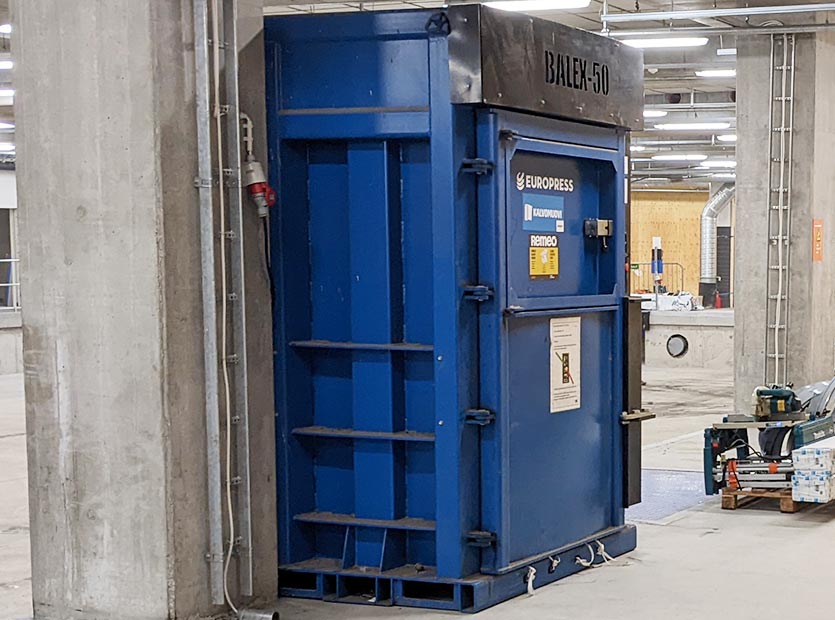 Selecting between a waste compactor and a baler depends largely on your business’s specific needs and waste outputs. Each machine has distinct features that cater to different waste management requirements. If you are a large facility and have a mixture of recyclable and non-recyclable waste then you may need both types of machine.
Selecting between a waste compactor and a baler depends largely on your business’s specific needs and waste outputs. Each machine has distinct features that cater to different waste management requirements. If you are a large facility and have a mixture of recyclable and non-recyclable waste then you may need both types of machine.
However, if budget constraints are in place or if your business generates large quantities of general waste, a compactor may be the better choice. Waste compactors are designed to handle mixed waste materials, reducing their volume and making them easier to manage.
The type of waste materials you generate is another important factor. If your primary concern is managing specific recyclable materials like cardboard or plastics, a baler would be more suitable. Balers are designed to create uniform bales of recyclable materials, facilitating easier storage, transportation, and recycling.
Budget considerations and potential cost savings also influence the choice. While both machines require an initial investment, compactors can lead to significant savings in disposal costs by reducing waste volume. Balers, on the other hand, can reduce transportation costs and improve recycling efficiency, leading to long-term savings.
Available space for equipment installation is another critical factor. Compactors often require a larger footprint than balers, so it’s essential to assess your available space before making a decision. Balers can be more space-efficient in facilities needing to process specific materials.
Finally, your long-term sustainability goals can guide you towards the appropriate machine. If your focus is on reducing overall waste and improving site cleanliness, a compactor might be ideal. If you’re committed to enhancing recycling efforts and reducing environmental impact, a baler could be the better fit.
Impact on Business Operations
Efficient waste management can significantly impact various aspects of your business operations. Implementing the right equipment can lead to a cleaner, safer, and more organised work environment. Kenburn are also able to offer on-site training to show how to use their machines safely. We also provide maintenance options to help ensure that your compactors and balers perform at their best for years to come.
Effective waste management improves overall site cleanliness and safety. By reducing the volume of waste and ensuring it’s properly compacted or baled, you can minimise clutter and potential hazards. This creates a safer working environment and reduces the risk of accidents or injuries.
Reduced waste costs lead to substantial financial savings. By minimising the volume of waste through compactors or enhancing recycling efficiency with balers, you can cut down on disposal and transportation costs. This leaves more room in your budget for other critical business needs.
Enhanced waste handling processes contribute to smoother daily operations. With organised and efficient waste management, businesses can reduce disruptions caused by waste collection and sorting. This leads to improved productivity and a more streamlined workflow.
Compliance with waste regulations enhances your business reputation. Proper waste management ensures that you meet legal requirements and avoid potential fines. This demonstrates your commitment to environmental responsibility and can improve your standing with customers and stakeholders.
Better waste management also supports employee well-being and morale. A clean and well-organised workspace creates a more pleasant environment for employees, boosting their morale and productivity. When employees see that their company is committed to sustainability and responsible waste management, it can enhance their job satisfaction and loyalty.
Environmental Benefits of Recycling
Recycling offers numerous environmental benefits that extend beyond waste reduction and disposal. By adopting efficient recycling practices, businesses contribute positively to the environment and support sustainable development goals.
One significant benefit is that recycling reduces the strain on landfills and incineration facilities. By diverting materials away from these waste disposal methods, recycling helps conserve landfill space and reduces the environmental impact of incineration, such as air pollution and greenhouse gas emissions.
Reusing materials through recycling conserves natural resources and energy. Producing new products from raw materials requires significant amounts of energy and natural resources. By recycling materials like plastics, paper, and metals, businesses can reduce the demand for virgin resources and decrease energy consumption.
Efficient recycling practices also lower the carbon footprint of businesses. By recycling materials instead of disposing of them as waste, companies reduce the carbon emissions associated with waste transportation and processing. This contributes to mitigating climate change and aligns with global efforts to reduce carbon emissions.
Support for recycling reinforces corporate social responsibility goals. By actively participating in recycling programs, businesses demonstrate their commitment to environmental stewardship and social responsibility. This can improve the company’s public image and foster trust among customers and stakeholders.
Educating employees and customers about recycling promotes environmental stewardship. By raising awareness and encouraging recycling behaviours, businesses can create a culture of sustainability within their organisation and community. This collective effort can lead to more significant environmental impacts and drive positive change.
Key Differences to Consider
Understanding the key differences between compactors and balers is essential for making an informed decision about which machine best suits your waste management needs. While both serve to optimise waste handling, they do so in distinct ways.
Compactors handle mixed waste, while balers focus on specific recyclable materials. Waste compactors are versatile machines suitable for compressing various types of waste, making them ideal for businesses dealing with general refuse. In contrast, balers are designed for creating uniform bales of materials like cardboard, plastics, and paper, facilitating efficient recycling.
Compactors reduce waste volume, whereas balers prepare it for recycling. The primary function of compactors is to decrease the overall volume of waste, making it more manageable and cost-effective to dispose of. Balers, on the other hand, aim to organise and prepare recyclable materials for efficient processing and transportation.
Balers create uniform bales for easy transport, unlike compactors. The compacted waste from a compactor may still require sorting and handling, while bales from a baler are neatly bound and ready for transport. This uniformity simplifies logistics and improves the efficiency of recycling operations.
Compactors are often favoured for managing high volumes of general waste. Their ability to compress mixed waste makes them suitable for industries generating large amounts of non-recyclable materials. Balers excel in industries with significant recyclable material output, such as recycling centres, manufacturing facilities, and retail businesses.
Ultimately, the choice between a compactor and a waste baler depends on the type of waste your business generates, your recycling goals, and the available space and budget. By thoroughly understanding the functions and benefits of each machine, you can make an informed decision that enhances your waste management practices.
Have you decided which waste management solution suits your business best? Still not sure? Get in touch today!

